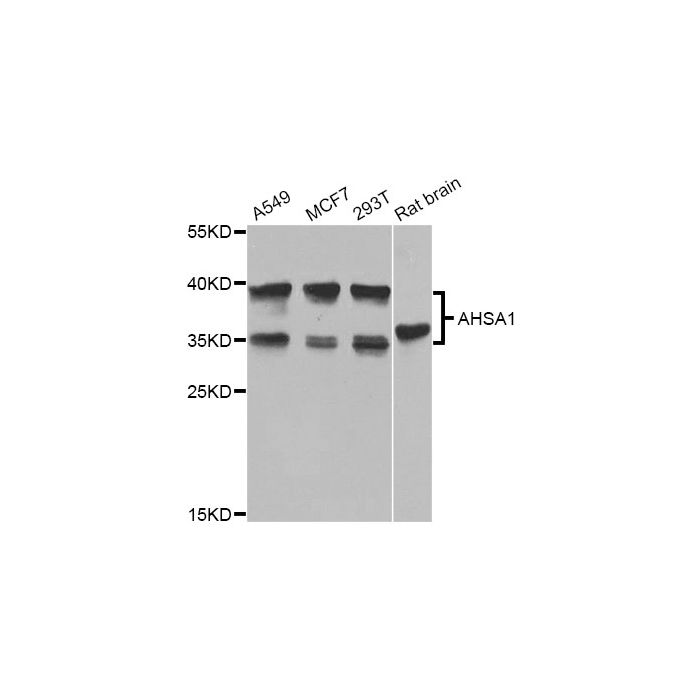AHA-1 polyclonal, anti-human, mouse, rat
€388.00
In stock
SKU
BS71870
Background:
AHA-1 stimulates the inherent ATPase activity of yeast and human HSP 90 and interacts with the cytoplasmic tail of vesticular stomatitis virus glycoprotein. AHA-1 regulates HSP 90 by influencing the conformational state of the “ATP lid” and consequent N-terminal dimerization. It is crucial for cell viability under non-optimal growth conditions when HSP 90 levels are limiting. AHA-1 is a cytosolic protein and may transiently interact with the endoplasmic reticulum. It can have an affect on one step in the endoplasmic to Golgi trafficking. AHA-1 is expressed in numerous tissues, including brain, heart, skeletal muscle and kidney, and at lower levels in liver and placenta. It is induced by heat shock and treatment with the HSP 90 inhibitor 17-demethoxygeldanamycin.
Alternative Name:
AHSA1, AHA1, C14ORF3, Activator of 90 kDa heat shock protein ATPase homolog 1, HSPC322
Application Dilution: WB: 1:500 - 1:2000
Specificity: AHA-1 polyclonal antibody detects endogenous levels of AHA-1 protein.
Immunogen:
Recombinant protein of human AHSA1
MW: 38kDa
Swis Prot.: O95433
Purification & Purity:
The antibody was affinity-purified from rabbit antiserum by affinity-chromatography using epitope-specific immunogen and the purity is > 95% (by SDS-PAGE).
Format:
1mg/ml in PBS with 0.1% Sodium Azide, 50% Glycerol.
Storage:
Store at 4°C short term. Aliquot and store at -20°C long term. Avoid freeze-thaw cycles.
For research use only, not for use in diagnostic procedure.
AHA-1 stimulates the inherent ATPase activity of yeast and human HSP 90 and interacts with the cytoplasmic tail of vesticular stomatitis virus glycoprotein. AHA-1 regulates HSP 90 by influencing the conformational state of the “ATP lid” and consequent N-terminal dimerization. It is crucial for cell viability under non-optimal growth conditions when HSP 90 levels are limiting. AHA-1 is a cytosolic protein and may transiently interact with the endoplasmic reticulum. It can have an affect on one step in the endoplasmic to Golgi trafficking. AHA-1 is expressed in numerous tissues, including brain, heart, skeletal muscle and kidney, and at lower levels in liver and placenta. It is induced by heat shock and treatment with the HSP 90 inhibitor 17-demethoxygeldanamycin.
Alternative Name:
AHSA1, AHA1, C14ORF3, Activator of 90 kDa heat shock protein ATPase homolog 1, HSPC322
Application Dilution: WB: 1:500 - 1:2000
Specificity: AHA-1 polyclonal antibody detects endogenous levels of AHA-1 protein.
Immunogen:
Recombinant protein of human AHSA1
MW: 38kDa
Swis Prot.: O95433
Purification & Purity:
The antibody was affinity-purified from rabbit antiserum by affinity-chromatography using epitope-specific immunogen and the purity is > 95% (by SDS-PAGE).
Format:
1mg/ml in PBS with 0.1% Sodium Azide, 50% Glycerol.
Storage:
Store at 4°C short term. Aliquot and store at -20°C long term. Avoid freeze-thaw cycles.
For research use only, not for use in diagnostic procedure.
| Is Featured? | No |
|---|
Write Your Own Review

